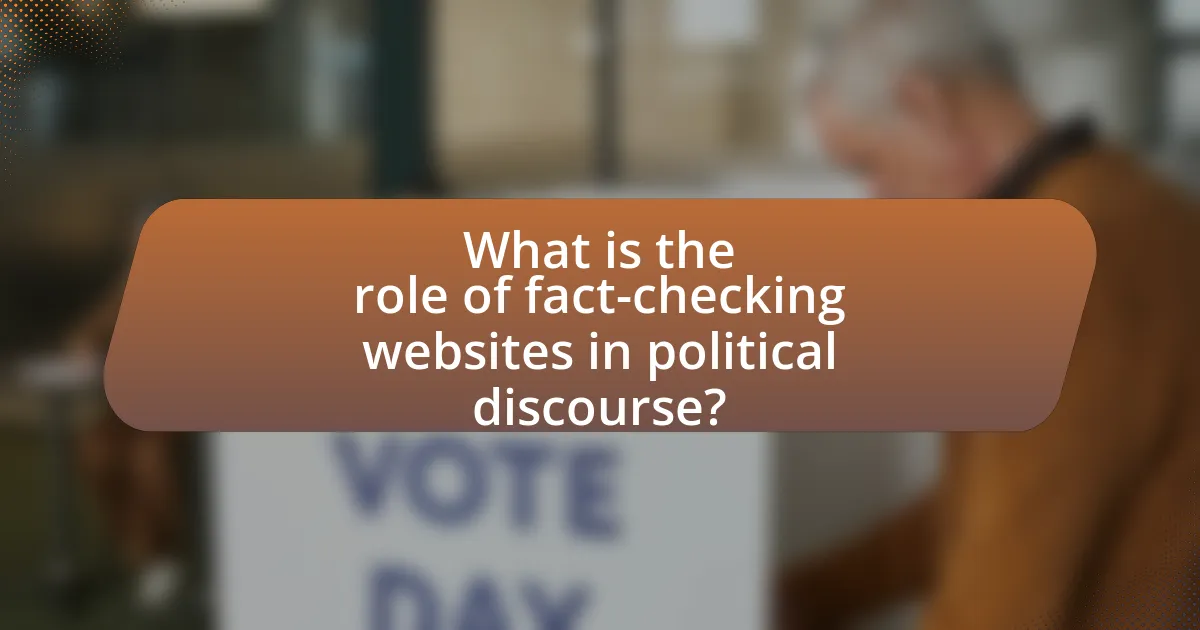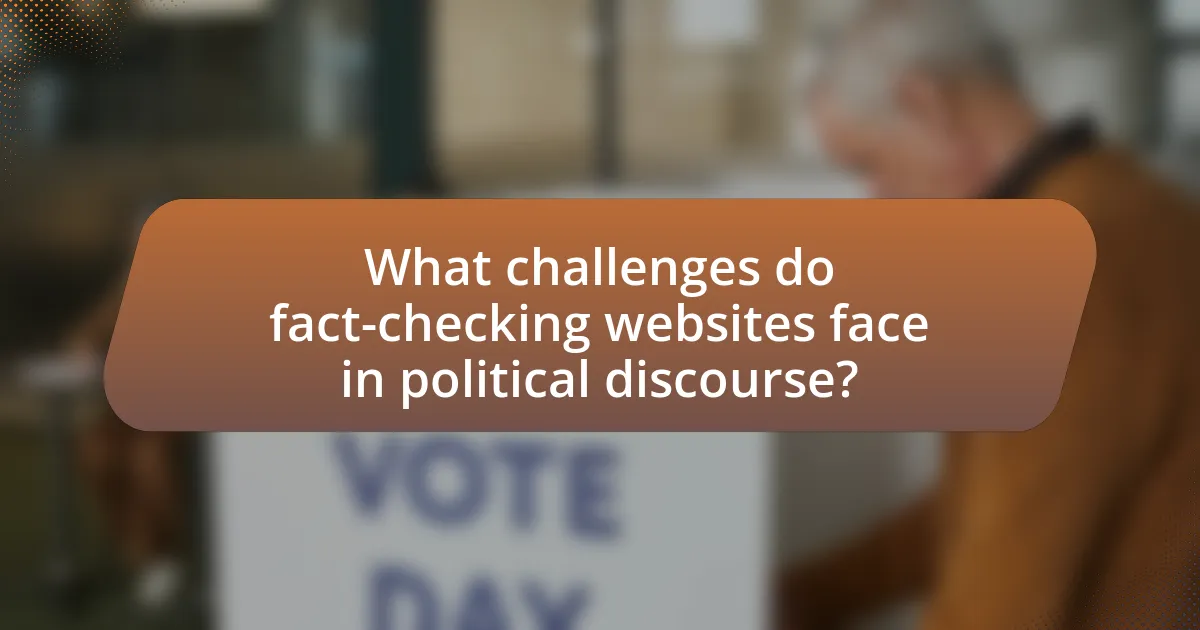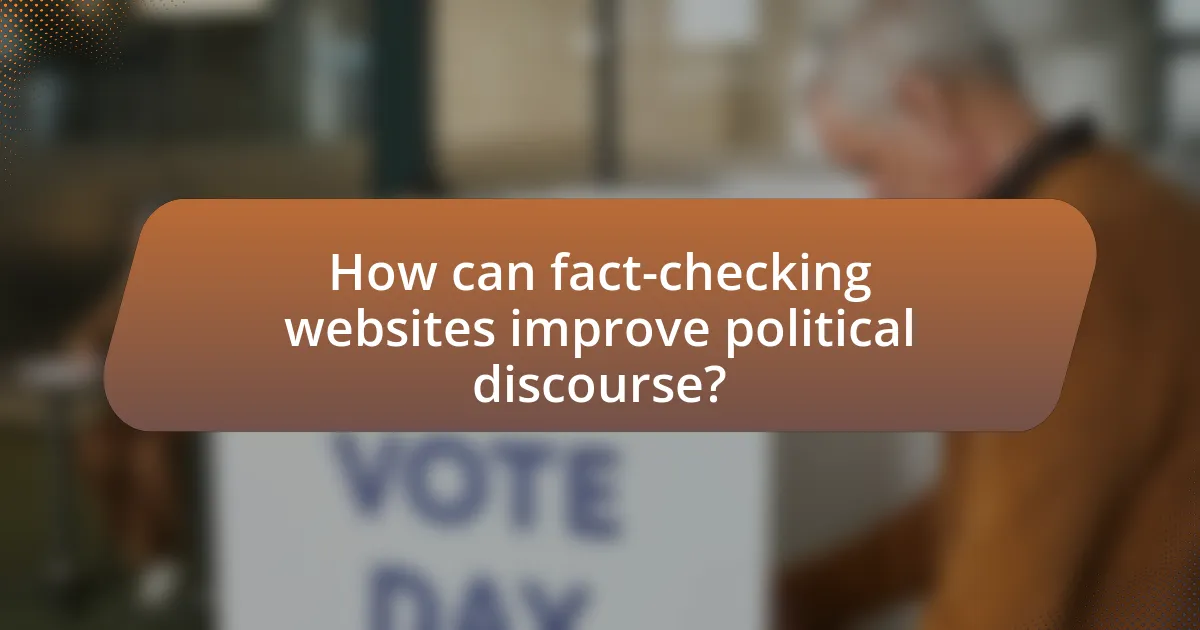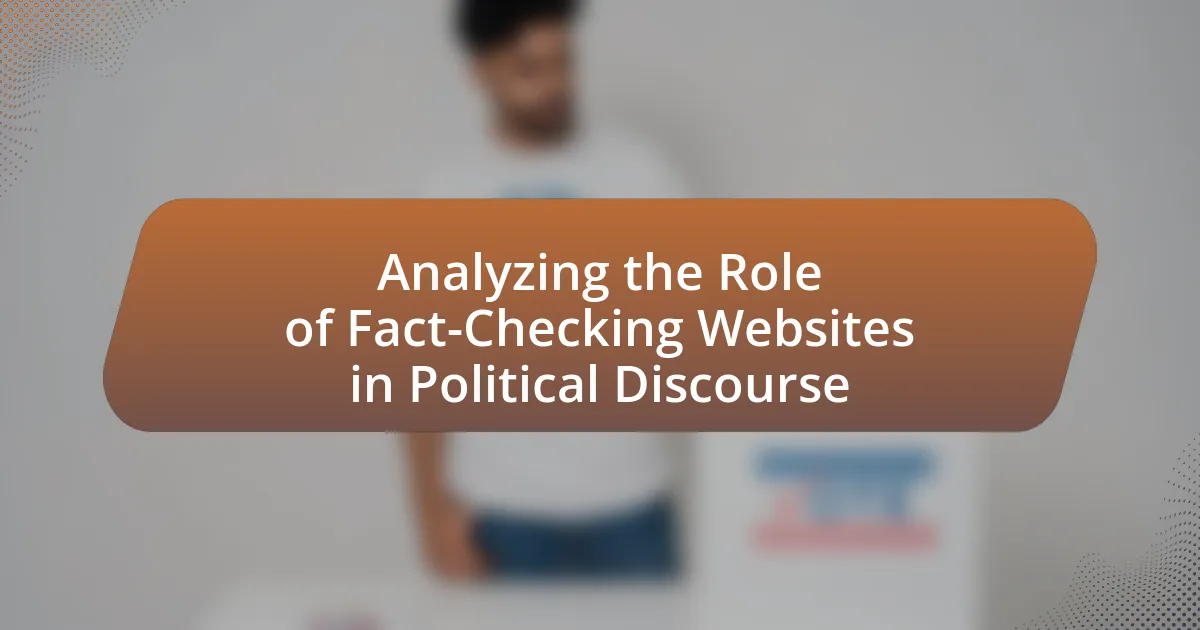Fact-checking websites are essential in political discourse, serving to verify the accuracy of statements made by public figures and media outlets. They combat misinformation, promote informed decision-making, and enhance accountability among politicians. The article explores the methodologies employed by these platforms, their impact on public opinion, and the challenges they face, including biases and the rapid spread of false narratives. Additionally, it discusses how fact-checking websites can improve political discourse through transparency, audience engagement, and partnerships, while also examining future trends in the integration of technology and social media in their operations.

What is the role of fact-checking websites in political discourse?
Fact-checking websites play a crucial role in political discourse by verifying the accuracy of statements made by public figures and media outlets. These platforms help to combat misinformation and promote informed decision-making among the electorate. For instance, during the 2020 U.S. presidential election, fact-checking organizations like PolitiFact and FactCheck.org assessed thousands of claims, providing evidence-based evaluations that informed voters about the truthfulness of political rhetoric. This process not only enhances accountability among politicians but also fosters a more informed public, ultimately contributing to healthier democratic engagement.
How do fact-checking websites operate within political contexts?
Fact-checking websites operate within political contexts by verifying claims made by politicians, political parties, and media outlets to promote accountability and transparency. These websites analyze statements against factual evidence, often using a systematic approach that includes sourcing data from credible references, expert opinions, and public records. For instance, during election cycles, fact-checking organizations like PolitiFact and FactCheck.org assess the accuracy of campaign statements, which helps inform voters and mitigate misinformation. Their findings are often published in easily digestible formats, allowing the public to quickly understand the veracity of political claims. This process not only aids in public discourse but also influences media coverage and political behavior by holding figures accountable for false statements.
What methodologies do fact-checking websites use to verify information?
Fact-checking websites use a variety of methodologies to verify information, including source verification, cross-referencing, and expert consultation. Source verification involves checking the credibility of the original source of the information, ensuring it is reliable and authoritative. Cross-referencing entails comparing the claim against multiple reputable sources to confirm its accuracy. Expert consultation involves reaching out to subject matter experts to gain insights and validate complex claims. These methodologies are essential for maintaining accuracy and credibility in the fact-checking process, as evidenced by organizations like PolitiFact and Snopes, which adhere to rigorous standards to ensure the reliability of their findings.
How do fact-checking websites source their information?
Fact-checking websites source their information primarily through a combination of expert analysis, primary source verification, and data from reputable organizations. These websites often review statements made by public figures and cross-reference them with credible sources such as academic research, government reports, and statistical databases. For instance, PolitiFact and FactCheck.org utilize a rigorous methodology that includes consulting subject matter experts and examining original documents to ensure accuracy. This approach is supported by their commitment to transparency, often providing links to the sources they used for verification, which enhances their credibility and allows users to trace the information back to its origin.
Why are fact-checking websites important for political discourse?
Fact-checking websites are important for political discourse because they provide verified information that helps combat misinformation and promotes informed decision-making among the public. By analyzing claims made by politicians and media, these platforms enhance accountability and transparency in political communication. For instance, a study by the Pew Research Center found that 64% of Americans believe that fact-checking helps them understand political issues better. This indicates that fact-checking websites play a crucial role in fostering a more informed electorate, ultimately contributing to healthier democratic processes.
What impact do fact-checking websites have on public opinion?
Fact-checking websites significantly influence public opinion by increasing awareness of misinformation and promoting informed decision-making. Research indicates that individuals who engage with fact-checking content are more likely to adjust their beliefs in response to factual corrections. For instance, a study published in the journal “Political Communication” found that exposure to fact-checking can reduce the acceptance of false claims by up to 30%. This demonstrates that fact-checking websites play a crucial role in shaping perceptions and enhancing the overall quality of public discourse.
How do fact-checking websites contribute to accountability in politics?
Fact-checking websites contribute to accountability in politics by verifying claims made by politicians and public figures, thereby holding them responsible for misinformation. These platforms analyze statements against factual evidence, providing transparency and fostering informed public discourse. For instance, a study by the Pew Research Center found that 62% of Americans believe fact-checking helps hold politicians accountable. By exposing falsehoods, fact-checking websites encourage political figures to be more truthful, ultimately enhancing the integrity of political communication.

What challenges do fact-checking websites face in political discourse?
Fact-checking websites face significant challenges in political discourse, primarily due to misinformation, bias, and the rapid spread of false narratives. Misinformation is prevalent, with studies indicating that false information spreads six times faster than the truth on social media platforms, complicating the efforts of fact-checkers to correct inaccuracies. Additionally, perceived bias can undermine the credibility of fact-checking organizations, as political affiliations may lead audiences to dismiss their findings. Furthermore, the sheer volume of claims made during political campaigns overwhelms fact-checkers, making it difficult to address every falsehood effectively. These challenges collectively hinder the ability of fact-checking websites to promote informed political discourse.
How do biases affect the credibility of fact-checking websites?
Biases significantly undermine the credibility of fact-checking websites by influencing the selection and interpretation of information. When fact-checkers exhibit political or ideological biases, they may prioritize certain narratives over others, leading to selective reporting and potential misinformation. For instance, a study by the Pew Research Center found that 62% of Americans believe that fact-checkers have a political bias, which can erode public trust in their assessments. This perception of bias can result in skepticism towards the accuracy of the fact-checks provided, ultimately diminishing the effectiveness of these websites in promoting informed political discourse.
What are the common criticisms of fact-checking websites?
Common criticisms of fact-checking websites include allegations of bias, lack of transparency, and inconsistency in their methodologies. Critics argue that some fact-checkers may favor certain political viewpoints, leading to perceived partiality in their assessments. Additionally, concerns arise regarding the transparency of their sources and the criteria used for determining the veracity of claims, which can undermine trust. Inconsistencies in how different fact-checking organizations evaluate similar statements can also lead to confusion and skepticism among the public. These criticisms highlight the need for rigorous standards and accountability in the fact-checking process to maintain credibility in political discourse.
How do fact-checking websites address accusations of bias?
Fact-checking websites address accusations of bias by implementing transparent methodologies and providing clear explanations of their processes. These websites often publish their criteria for selecting claims to fact-check, which helps to demonstrate impartiality. For instance, organizations like PolitiFact and FactCheck.org disclose their rating systems and the sources they rely on, allowing users to understand how conclusions are drawn. Additionally, many fact-checking sites engage in peer review and adhere to standards set by organizations such as the International Fact-Checking Network, which promotes accountability and ethical practices in fact-checking. This commitment to transparency and adherence to established guidelines serves to counteract claims of bias and reinforces their credibility in political discourse.
What role does misinformation play in the effectiveness of fact-checking websites?
Misinformation significantly undermines the effectiveness of fact-checking websites by creating a continuous cycle of false narratives that these platforms must address. When misinformation proliferates, it can overwhelm fact-checkers, making it challenging for them to keep up with the volume of claims needing verification. For instance, a study by the Pew Research Center found that 64% of Americans believe that misinformation has a major impact on public opinion, indicating that the presence of false information can distort perceptions and diminish trust in factual corrections. Consequently, the more misinformation spreads, the more resources fact-checking websites must allocate to counteract it, which can dilute their overall impact and effectiveness in promoting accurate information.
How do fact-checking websites combat the spread of misinformation?
Fact-checking websites combat the spread of misinformation by verifying claims made in public discourse and providing accurate information to the public. These platforms employ a systematic approach that includes researching the context of statements, consulting credible sources, and analyzing evidence to determine the truthfulness of claims. For instance, organizations like PolitiFact and FactCheck.org utilize a rating system to categorize the accuracy of statements, which helps users quickly assess the reliability of information. By publishing their findings and promoting transparency, fact-checking websites educate the public about misinformation and encourage critical thinking, thereby reducing the likelihood of false narratives gaining traction.
What strategies do fact-checking websites use to engage audiences?
Fact-checking websites engage audiences through interactive content, social media presence, and transparency in their methodologies. These strategies include creating quizzes and polls that encourage user participation, utilizing platforms like Twitter and Facebook to disseminate information quickly, and providing clear explanations of their fact-checking processes to build trust. For instance, the Pew Research Center found that 64% of Americans believe fact-checking helps them understand political issues better, indicating that these engagement strategies effectively resonate with audiences.

How can fact-checking websites improve political discourse?
Fact-checking websites can improve political discourse by providing accurate information that counters misinformation and promotes informed discussions. These platforms analyze claims made by public figures and media, offering evidence-based evaluations that help users discern truth from falsehood. For instance, a study by the Pew Research Center found that 64% of Americans believe fact-checking helps them understand political issues better. By fostering transparency and accountability, fact-checking websites encourage a more educated electorate, ultimately leading to healthier political debates and decision-making processes.
What best practices can fact-checking websites adopt?
Fact-checking websites can adopt best practices such as maintaining transparency in their methodologies, ensuring the use of credible sources, and providing clear explanations of their findings. Transparency allows users to understand how conclusions are reached, which builds trust; for instance, the International Fact-Checking Network emphasizes the importance of disclosing sources and methods. Utilizing credible sources ensures the accuracy of information, as seen in the rigorous standards set by organizations like PolitiFact and Snopes. Additionally, clear explanations help users grasp complex issues, enhancing public understanding and engagement in political discourse.
How can fact-checking websites enhance their outreach and education efforts?
Fact-checking websites can enhance their outreach and education efforts by utilizing social media platforms to disseminate accurate information quickly and engagingly. By creating shareable content, such as infographics and short videos, these websites can reach a broader audience and encourage public engagement. Research indicates that social media posts with visual elements are 94% more likely to be shared than text-only posts, highlighting the effectiveness of this approach. Additionally, partnerships with educational institutions can facilitate workshops and seminars that promote media literacy, empowering individuals to critically evaluate information sources. This dual strategy of leveraging social media and educational collaborations can significantly improve the public’s understanding of misinformation and the importance of fact-checking.
What partnerships can fact-checking websites form to strengthen their impact?
Fact-checking websites can form partnerships with media organizations, academic institutions, and technology platforms to strengthen their impact. Collaborating with media organizations allows fact-checkers to reach wider audiences and enhance credibility through established channels. Partnerships with academic institutions can provide access to research resources and methodologies, improving the rigor of fact-checking processes. Additionally, alliances with technology platforms, such as social media companies, can facilitate the dissemination of fact-checked information and help combat misinformation at scale. These partnerships are supported by initiatives like the International Fact-Checking Network, which promotes collaboration among fact-checkers globally, demonstrating the effectiveness of such alliances in enhancing the credibility and reach of fact-checking efforts.
What tools and technologies can support fact-checking websites?
Fact-checking websites can be supported by tools and technologies such as automated fact-checking software, natural language processing (NLP) algorithms, and data verification platforms. Automated fact-checking software, like ClaimBuster, analyzes claims in real-time and compares them against a database of verified information, enhancing the speed and accuracy of fact-checking. NLP algorithms enable the extraction of relevant information from large datasets, allowing fact-checkers to efficiently identify and verify claims. Data verification platforms, such as Snopes and PolitiFact, provide comprehensive databases of fact-checked information, which can be integrated into fact-checking websites to ensure reliability and credibility. These tools collectively improve the efficiency and effectiveness of fact-checking processes, contributing to informed political discourse.
How can data analytics improve the effectiveness of fact-checking websites?
Data analytics can enhance the effectiveness of fact-checking websites by enabling the identification of misinformation trends and user engagement patterns. By analyzing large datasets, fact-checking platforms can pinpoint which claims are most frequently disputed, allowing them to prioritize their resources on high-impact topics. For instance, a study by the Pew Research Center found that fact-checking organizations that utilized data analytics were able to respond more swiftly to emerging misinformation, thus increasing their relevance and reach. Furthermore, analytics can track user interactions, helping websites tailor their content to better meet audience needs, ultimately fostering greater trust and credibility in the fact-checking process.
What role does social media play in the dissemination of fact-checked information?
Social media serves as a crucial platform for the dissemination of fact-checked information by enabling rapid sharing and broad reach among users. It facilitates the immediate distribution of verified content from fact-checking organizations to a wide audience, enhancing public awareness and understanding of accurate information. According to a study by the Pew Research Center, 64% of Americans believe that social media is a significant source for news, which underscores its influence in shaping public discourse. Furthermore, social media platforms often incorporate features that promote fact-checked content, such as labels or warnings on misinformation, thereby guiding users toward reliable sources. This dynamic interaction between social media and fact-checking organizations plays a vital role in combating misinformation and fostering informed discussions in political discourse.
What are the future trends for fact-checking websites in political discourse?
Future trends for fact-checking websites in political discourse include increased integration of artificial intelligence and machine learning to enhance the speed and accuracy of fact-checking processes. These technologies will enable real-time verification of claims made during political debates and social media interactions, addressing the growing demand for immediate information validation. Additionally, fact-checking websites are likely to expand their partnerships with social media platforms to combat misinformation more effectively, as evidenced by initiatives like Facebook’s collaboration with third-party fact-checkers. Furthermore, there will be a greater emphasis on transparency and user engagement, with platforms providing clearer methodologies and encouraging public participation in the fact-checking process. This trend is supported by research indicating that user trust in fact-checking increases when methodologies are transparent and participatory.
